HND Business Unit 12: Organisational Behaviour Report Analysis
VerifiedAdded on 2022/12/23
|12
|3497
|73
Report
AI Summary
This report delves into organisational behaviour, examining how culture, politics, and power within Royal Dutch Shell influence individual and team performance. It evaluates content (Maslow, Herzberg) and process theories (Equity, Goal Setting) of motivation, along with motivational techniques to achieve organisational goals. The report compares effective and ineffective teams, applying OB concepts and philosophies to a business context. The report highlights how organisational culture, including factors like equal opportunities, open communication, and flexibility, influences employee behaviour and productivity. It emphasizes the importance of managing organisational politics by eliminating favouritism and addressing informal communication to mitigate negative impacts. Furthermore, the report discusses the significance of power dynamics, advocating for fair and ethical exercise of authority to foster discipline and achieve organisational objectives. The report also explores various motivation theories and techniques, such as Maslow's hierarchy, Herzberg's two-factor theory, equity theory, and goal-setting theory, to enhance employee motivation and performance. Finally, the report analyzes the characteristics of effective and ineffective teams and applies OB principles to real-world business scenarios.
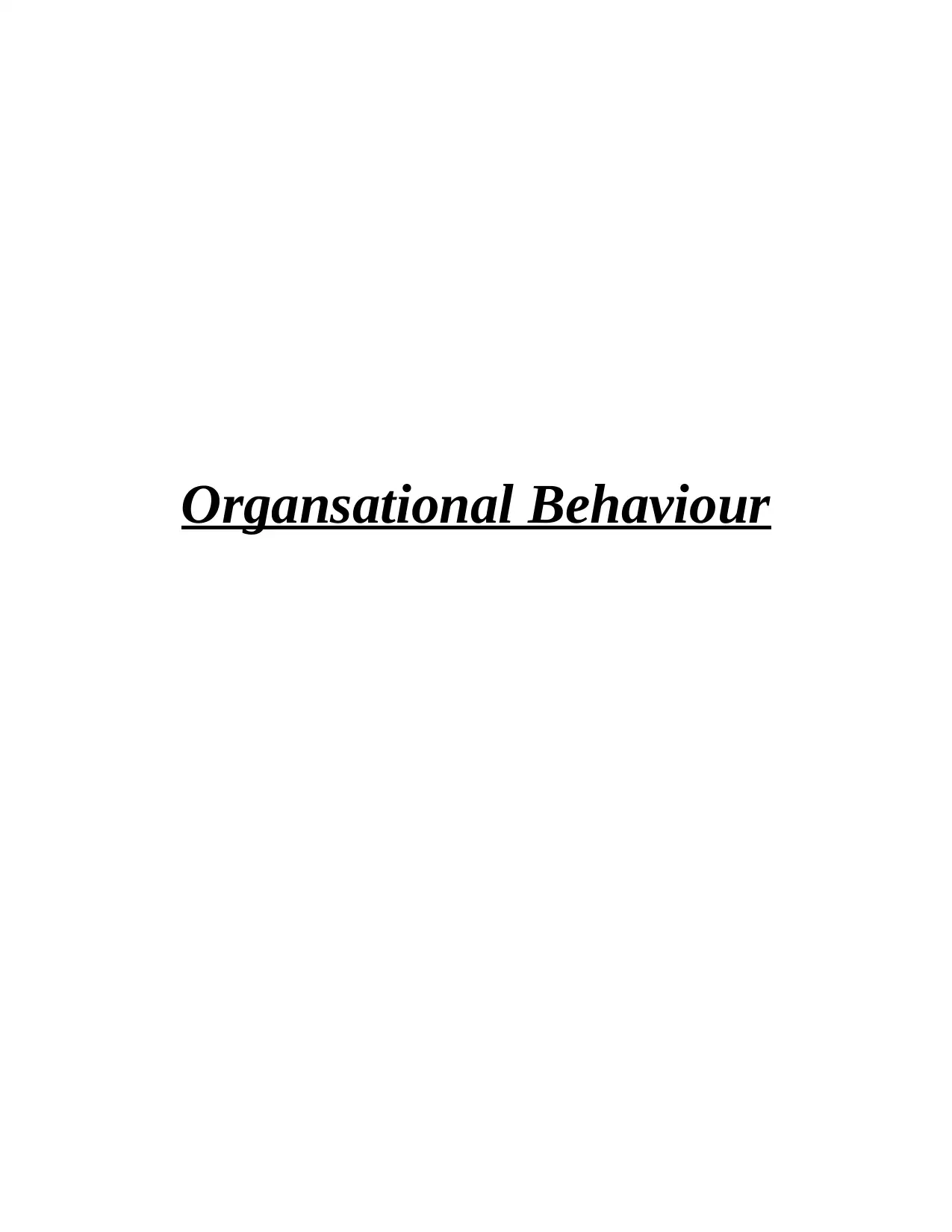
Organsational Behaviour
Paraphrase This Document
Need a fresh take? Get an instant paraphrase of this document with our AI Paraphraser
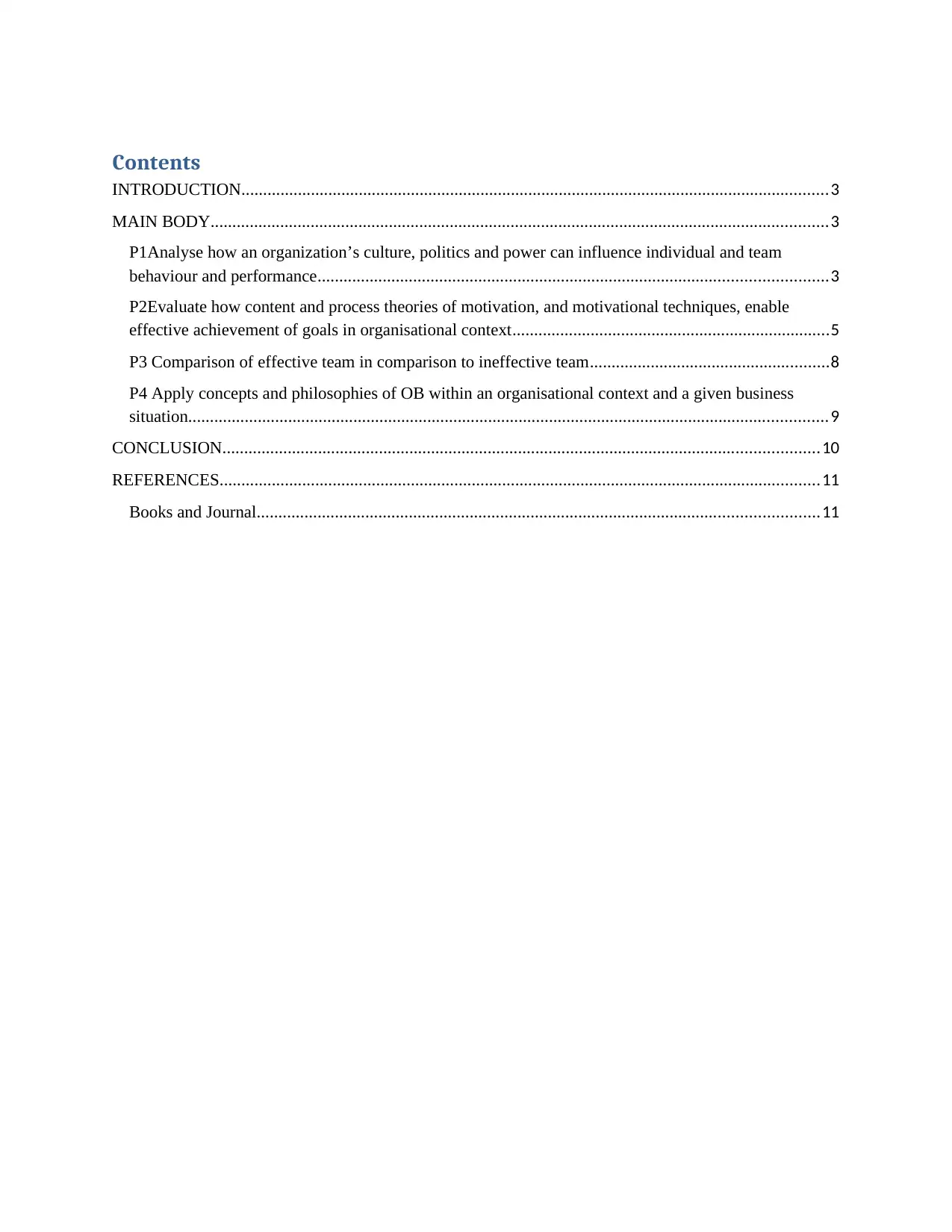
Contents
INTRODUCTION.......................................................................................................................................3
MAIN BODY..............................................................................................................................................3
P1Analyse how an organization’s culture, politics and power can influence individual and team
behaviour and performance.....................................................................................................................3
P2Evaluate how content and process theories of motivation, and motivational techniques, enable
effective achievement of goals in organisational context.........................................................................5
P3 Comparison of effective team in comparison to ineffective team.......................................................8
P4 Apply concepts and philosophies of OB within an organisational context and a given business
situation...................................................................................................................................................9
CONCLUSION.........................................................................................................................................10
REFERENCES..........................................................................................................................................11
Books and Journal.................................................................................................................................11
INTRODUCTION.......................................................................................................................................3
MAIN BODY..............................................................................................................................................3
P1Analyse how an organization’s culture, politics and power can influence individual and team
behaviour and performance.....................................................................................................................3
P2Evaluate how content and process theories of motivation, and motivational techniques, enable
effective achievement of goals in organisational context.........................................................................5
P3 Comparison of effective team in comparison to ineffective team.......................................................8
P4 Apply concepts and philosophies of OB within an organisational context and a given business
situation...................................................................................................................................................9
CONCLUSION.........................................................................................................................................10
REFERENCES..........................................................................................................................................11
Books and Journal.................................................................................................................................11
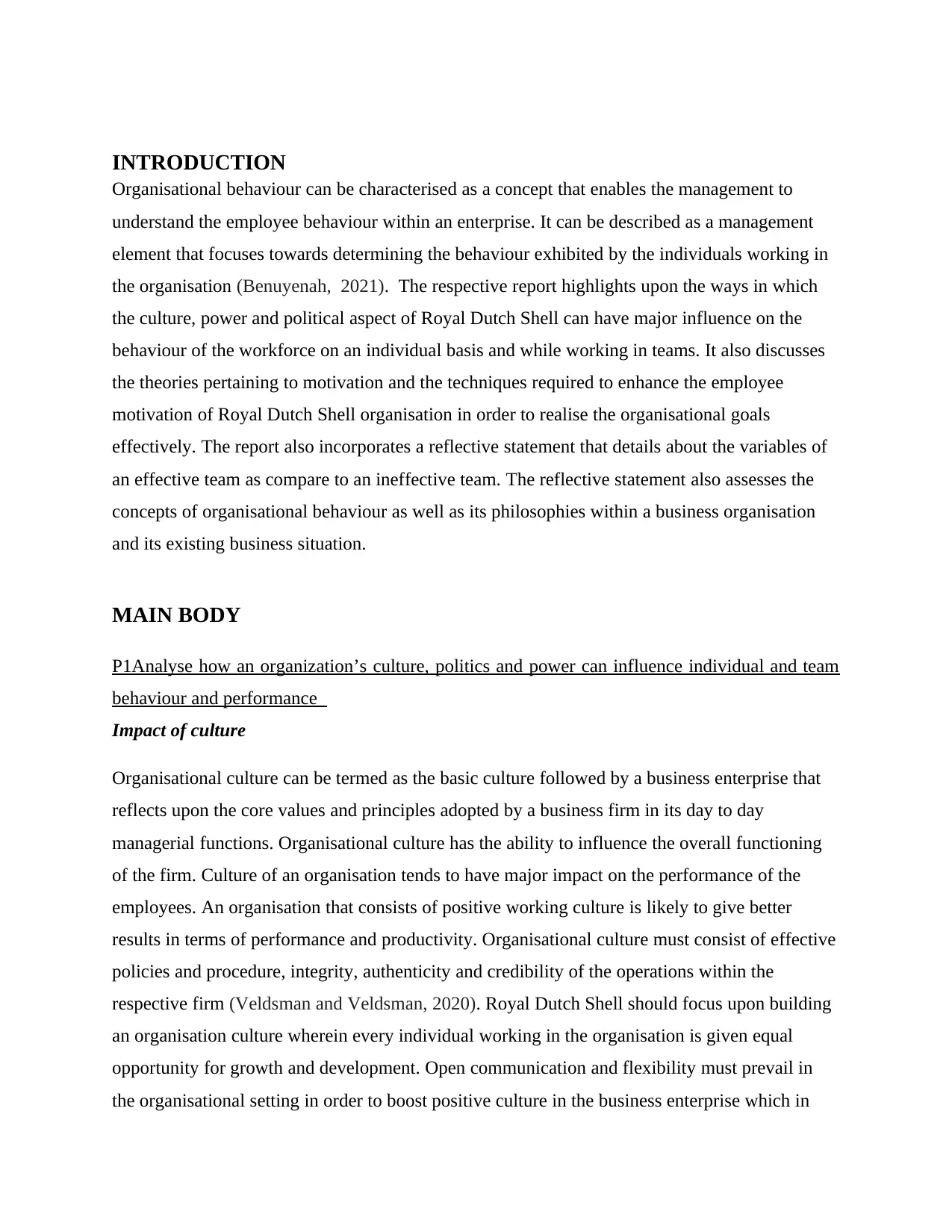
INTRODUCTION
Organisational behaviour can be characterised as a concept that enables the management to
understand the employee behaviour within an enterprise. It can be described as a management
element that focuses towards determining the behaviour exhibited by the individuals working in
the organisation (Benuyenah, 2021). The respective report highlights upon the ways in which
the culture, power and political aspect of Royal Dutch Shell can have major influence on the
behaviour of the workforce on an individual basis and while working in teams. It also discusses
the theories pertaining to motivation and the techniques required to enhance the employee
motivation of Royal Dutch Shell organisation in order to realise the organisational goals
effectively. The report also incorporates a reflective statement that details about the variables of
an effective team as compare to an ineffective team. The reflective statement also assesses the
concepts of organisational behaviour as well as its philosophies within a business organisation
and its existing business situation.
MAIN BODY
P1Analyse how an organization’s culture, politics and power can influence individual and team
behaviour and performance
Impact of culture
Organisational culture can be termed as the basic culture followed by a business enterprise that
reflects upon the core values and principles adopted by a business firm in its day to day
managerial functions. Organisational culture has the ability to influence the overall functioning
of the firm. Culture of an organisation tends to have major impact on the performance of the
employees. An organisation that consists of positive working culture is likely to give better
results in terms of performance and productivity. Organisational culture must consist of effective
policies and procedure, integrity, authenticity and credibility of the operations within the
respective firm (Veldsman and Veldsman, 2020). Royal Dutch Shell should focus upon building
an organisation culture wherein every individual working in the organisation is given equal
opportunity for growth and development. Open communication and flexibility must prevail in
the organisational setting in order to boost positive culture in the business enterprise which in
Organisational behaviour can be characterised as a concept that enables the management to
understand the employee behaviour within an enterprise. It can be described as a management
element that focuses towards determining the behaviour exhibited by the individuals working in
the organisation (Benuyenah, 2021). The respective report highlights upon the ways in which
the culture, power and political aspect of Royal Dutch Shell can have major influence on the
behaviour of the workforce on an individual basis and while working in teams. It also discusses
the theories pertaining to motivation and the techniques required to enhance the employee
motivation of Royal Dutch Shell organisation in order to realise the organisational goals
effectively. The report also incorporates a reflective statement that details about the variables of
an effective team as compare to an ineffective team. The reflective statement also assesses the
concepts of organisational behaviour as well as its philosophies within a business organisation
and its existing business situation.
MAIN BODY
P1Analyse how an organization’s culture, politics and power can influence individual and team
behaviour and performance
Impact of culture
Organisational culture can be termed as the basic culture followed by a business enterprise that
reflects upon the core values and principles adopted by a business firm in its day to day
managerial functions. Organisational culture has the ability to influence the overall functioning
of the firm. Culture of an organisation tends to have major impact on the performance of the
employees. An organisation that consists of positive working culture is likely to give better
results in terms of performance and productivity. Organisational culture must consist of effective
policies and procedure, integrity, authenticity and credibility of the operations within the
respective firm (Veldsman and Veldsman, 2020). Royal Dutch Shell should focus upon building
an organisation culture wherein every individual working in the organisation is given equal
opportunity for growth and development. Open communication and flexibility must prevail in
the organisational setting in order to boost positive culture in the business enterprise which in
⊘ This is a preview!⊘
Do you want full access?
Subscribe today to unlock all pages.

Trusted by 1+ million students worldwide
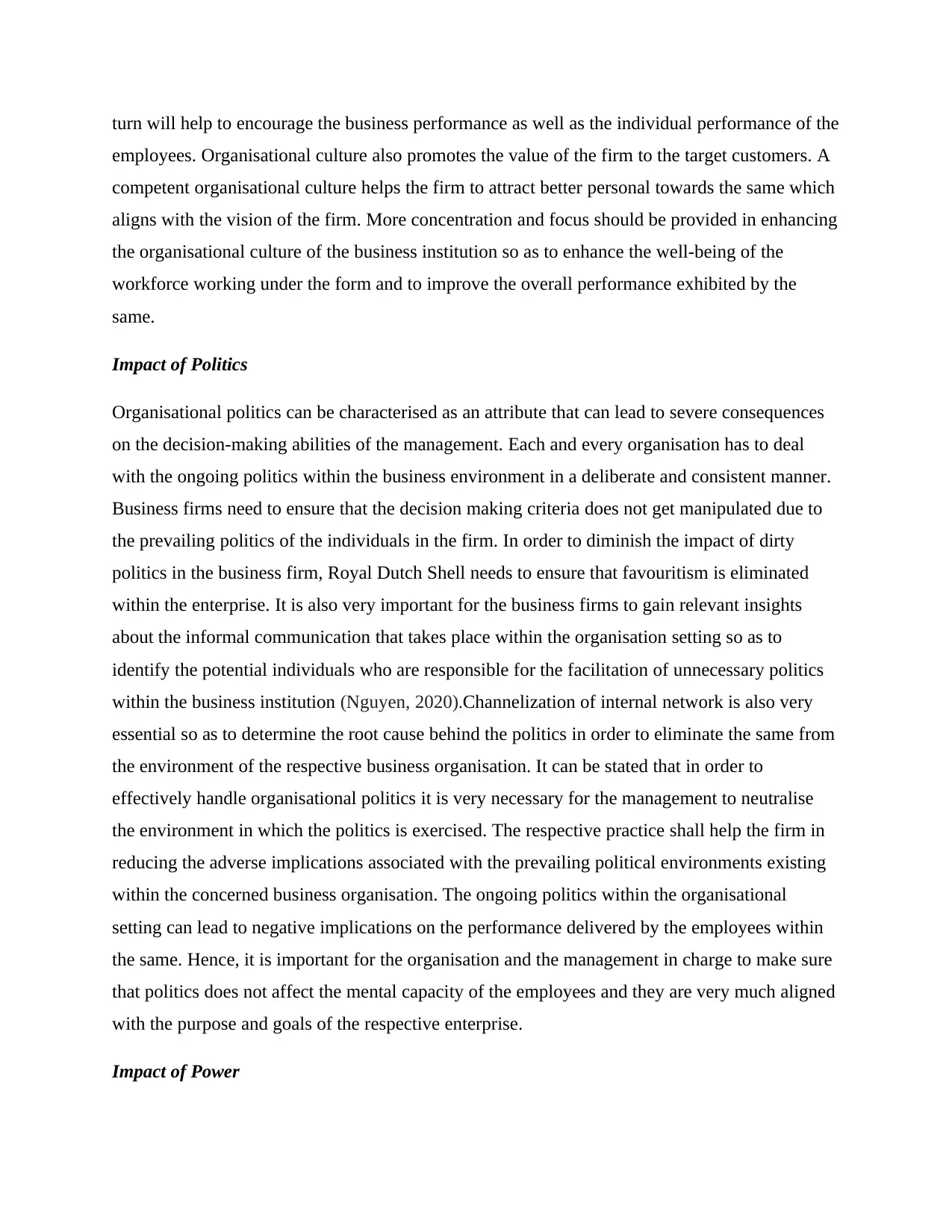
turn will help to encourage the business performance as well as the individual performance of the
employees. Organisational culture also promotes the value of the firm to the target customers. A
competent organisational culture helps the firm to attract better personal towards the same which
aligns with the vision of the firm. More concentration and focus should be provided in enhancing
the organisational culture of the business institution so as to enhance the well-being of the
workforce working under the form and to improve the overall performance exhibited by the
same.
Impact of Politics
Organisational politics can be characterised as an attribute that can lead to severe consequences
on the decision-making abilities of the management. Each and every organisation has to deal
with the ongoing politics within the business environment in a deliberate and consistent manner.
Business firms need to ensure that the decision making criteria does not get manipulated due to
the prevailing politics of the individuals in the firm. In order to diminish the impact of dirty
politics in the business firm, Royal Dutch Shell needs to ensure that favouritism is eliminated
within the enterprise. It is also very important for the business firms to gain relevant insights
about the informal communication that takes place within the organisation setting so as to
identify the potential individuals who are responsible for the facilitation of unnecessary politics
within the business institution (Nguyen, 2020).Channelization of internal network is also very
essential so as to determine the root cause behind the politics in order to eliminate the same from
the environment of the respective business organisation. It can be stated that in order to
effectively handle organisational politics it is very necessary for the management to neutralise
the environment in which the politics is exercised. The respective practice shall help the firm in
reducing the adverse implications associated with the prevailing political environments existing
within the concerned business organisation. The ongoing politics within the organisational
setting can lead to negative implications on the performance delivered by the employees within
the same. Hence, it is important for the organisation and the management in charge to make sure
that politics does not affect the mental capacity of the employees and they are very much aligned
with the purpose and goals of the respective enterprise.
Impact of Power
employees. Organisational culture also promotes the value of the firm to the target customers. A
competent organisational culture helps the firm to attract better personal towards the same which
aligns with the vision of the firm. More concentration and focus should be provided in enhancing
the organisational culture of the business institution so as to enhance the well-being of the
workforce working under the form and to improve the overall performance exhibited by the
same.
Impact of Politics
Organisational politics can be characterised as an attribute that can lead to severe consequences
on the decision-making abilities of the management. Each and every organisation has to deal
with the ongoing politics within the business environment in a deliberate and consistent manner.
Business firms need to ensure that the decision making criteria does not get manipulated due to
the prevailing politics of the individuals in the firm. In order to diminish the impact of dirty
politics in the business firm, Royal Dutch Shell needs to ensure that favouritism is eliminated
within the enterprise. It is also very important for the business firms to gain relevant insights
about the informal communication that takes place within the organisation setting so as to
identify the potential individuals who are responsible for the facilitation of unnecessary politics
within the business institution (Nguyen, 2020).Channelization of internal network is also very
essential so as to determine the root cause behind the politics in order to eliminate the same from
the environment of the respective business organisation. It can be stated that in order to
effectively handle organisational politics it is very necessary for the management to neutralise
the environment in which the politics is exercised. The respective practice shall help the firm in
reducing the adverse implications associated with the prevailing political environments existing
within the concerned business organisation. The ongoing politics within the organisational
setting can lead to negative implications on the performance delivered by the employees within
the same. Hence, it is important for the organisation and the management in charge to make sure
that politics does not affect the mental capacity of the employees and they are very much aligned
with the purpose and goals of the respective enterprise.
Impact of Power
Paraphrase This Document
Need a fresh take? Get an instant paraphrase of this document with our AI Paraphraser
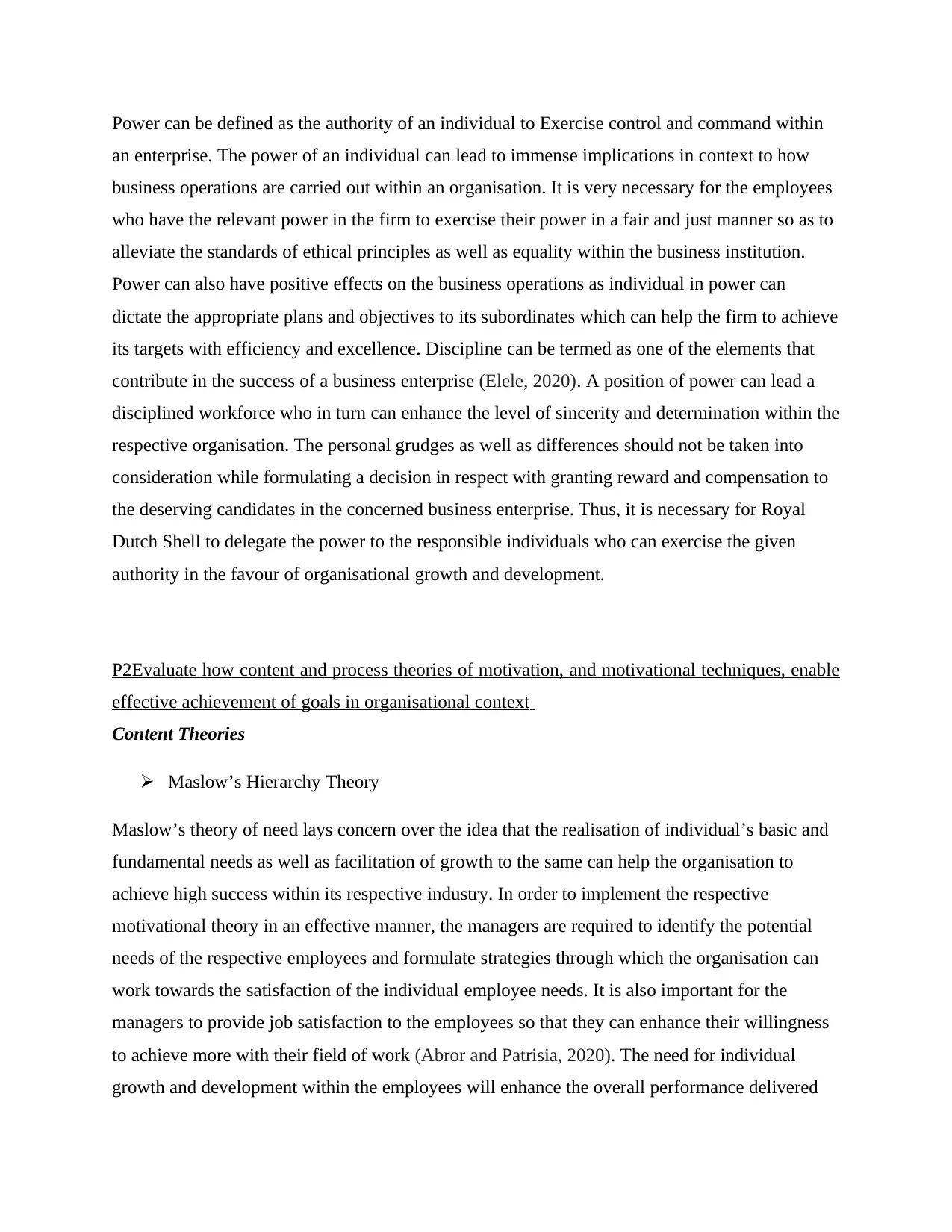
Power can be defined as the authority of an individual to Exercise control and command within
an enterprise. The power of an individual can lead to immense implications in context to how
business operations are carried out within an organisation. It is very necessary for the employees
who have the relevant power in the firm to exercise their power in a fair and just manner so as to
alleviate the standards of ethical principles as well as equality within the business institution.
Power can also have positive effects on the business operations as individual in power can
dictate the appropriate plans and objectives to its subordinates which can help the firm to achieve
its targets with efficiency and excellence. Discipline can be termed as one of the elements that
contribute in the success of a business enterprise (Elele, 2020). A position of power can lead a
disciplined workforce who in turn can enhance the level of sincerity and determination within the
respective organisation. The personal grudges as well as differences should not be taken into
consideration while formulating a decision in respect with granting reward and compensation to
the deserving candidates in the concerned business enterprise. Thus, it is necessary for Royal
Dutch Shell to delegate the power to the responsible individuals who can exercise the given
authority in the favour of organisational growth and development.
P2Evaluate how content and process theories of motivation, and motivational techniques, enable
effective achievement of goals in organisational context
Content Theories
Maslow’s Hierarchy Theory
Maslow’s theory of need lays concern over the idea that the realisation of individual’s basic and
fundamental needs as well as facilitation of growth to the same can help the organisation to
achieve high success within its respective industry. In order to implement the respective
motivational theory in an effective manner, the managers are required to identify the potential
needs of the respective employees and formulate strategies through which the organisation can
work towards the satisfaction of the individual employee needs. It is also important for the
managers to provide job satisfaction to the employees so that they can enhance their willingness
to achieve more with their field of work (Abror and Patrisia, 2020). The need for individual
growth and development within the employees will enhance the overall performance delivered
an enterprise. The power of an individual can lead to immense implications in context to how
business operations are carried out within an organisation. It is very necessary for the employees
who have the relevant power in the firm to exercise their power in a fair and just manner so as to
alleviate the standards of ethical principles as well as equality within the business institution.
Power can also have positive effects on the business operations as individual in power can
dictate the appropriate plans and objectives to its subordinates which can help the firm to achieve
its targets with efficiency and excellence. Discipline can be termed as one of the elements that
contribute in the success of a business enterprise (Elele, 2020). A position of power can lead a
disciplined workforce who in turn can enhance the level of sincerity and determination within the
respective organisation. The personal grudges as well as differences should not be taken into
consideration while formulating a decision in respect with granting reward and compensation to
the deserving candidates in the concerned business enterprise. Thus, it is necessary for Royal
Dutch Shell to delegate the power to the responsible individuals who can exercise the given
authority in the favour of organisational growth and development.
P2Evaluate how content and process theories of motivation, and motivational techniques, enable
effective achievement of goals in organisational context
Content Theories
Maslow’s Hierarchy Theory
Maslow’s theory of need lays concern over the idea that the realisation of individual’s basic and
fundamental needs as well as facilitation of growth to the same can help the organisation to
achieve high success within its respective industry. In order to implement the respective
motivational theory in an effective manner, the managers are required to identify the potential
needs of the respective employees and formulate strategies through which the organisation can
work towards the satisfaction of the individual employee needs. It is also important for the
managers to provide job satisfaction to the employees so that they can enhance their willingness
to achieve more with their field of work (Abror and Patrisia, 2020). The need for individual
growth and development within the employees will enhance the overall performance delivered
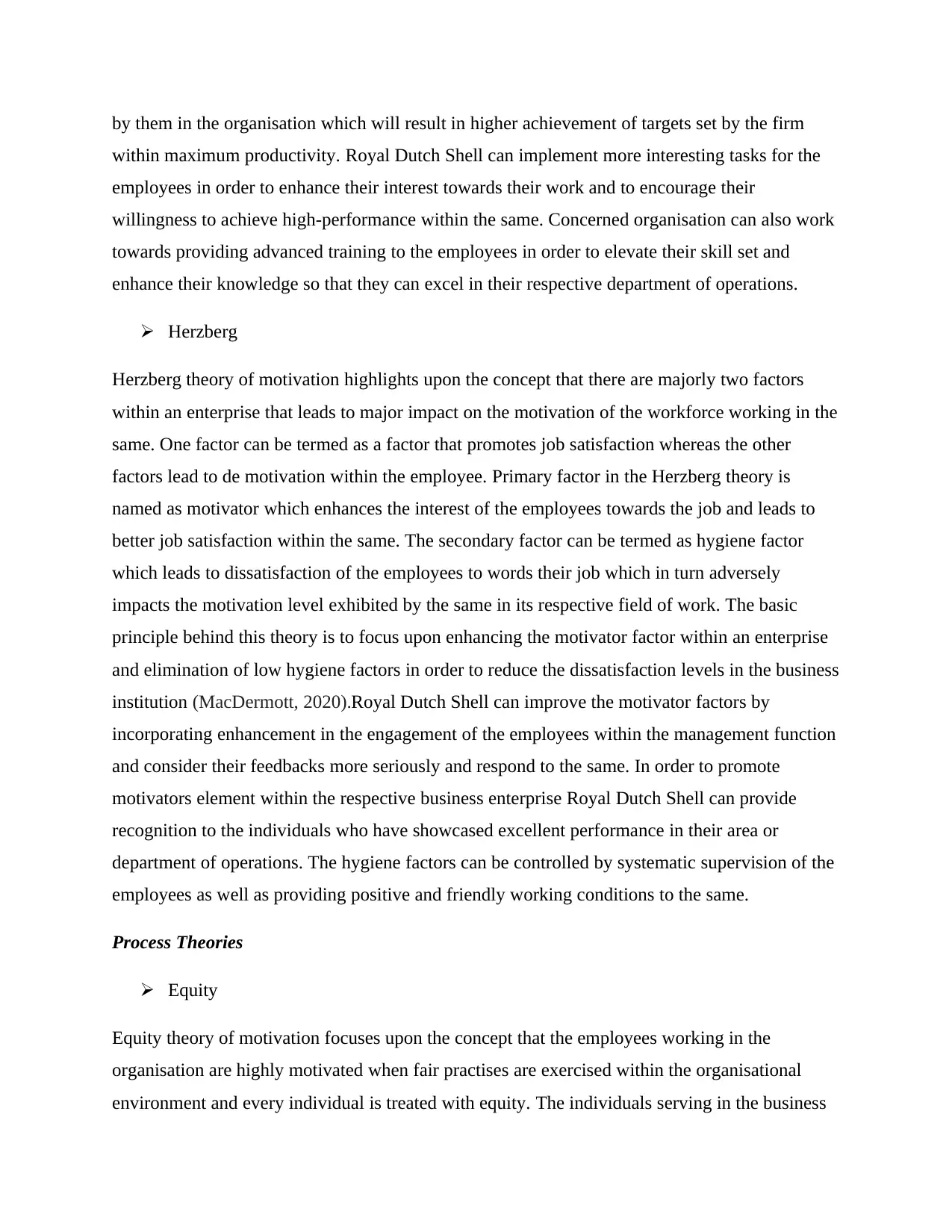
by them in the organisation which will result in higher achievement of targets set by the firm
within maximum productivity. Royal Dutch Shell can implement more interesting tasks for the
employees in order to enhance their interest towards their work and to encourage their
willingness to achieve high-performance within the same. Concerned organisation can also work
towards providing advanced training to the employees in order to elevate their skill set and
enhance their knowledge so that they can excel in their respective department of operations.
Herzberg
Herzberg theory of motivation highlights upon the concept that there are majorly two factors
within an enterprise that leads to major impact on the motivation of the workforce working in the
same. One factor can be termed as a factor that promotes job satisfaction whereas the other
factors lead to de motivation within the employee. Primary factor in the Herzberg theory is
named as motivator which enhances the interest of the employees towards the job and leads to
better job satisfaction within the same. The secondary factor can be termed as hygiene factor
which leads to dissatisfaction of the employees to words their job which in turn adversely
impacts the motivation level exhibited by the same in its respective field of work. The basic
principle behind this theory is to focus upon enhancing the motivator factor within an enterprise
and elimination of low hygiene factors in order to reduce the dissatisfaction levels in the business
institution (MacDermott, 2020).Royal Dutch Shell can improve the motivator factors by
incorporating enhancement in the engagement of the employees within the management function
and consider their feedbacks more seriously and respond to the same. In order to promote
motivators element within the respective business enterprise Royal Dutch Shell can provide
recognition to the individuals who have showcased excellent performance in their area or
department of operations. The hygiene factors can be controlled by systematic supervision of the
employees as well as providing positive and friendly working conditions to the same.
Process Theories
Equity
Equity theory of motivation focuses upon the concept that the employees working in the
organisation are highly motivated when fair practises are exercised within the organisational
environment and every individual is treated with equity. The individuals serving in the business
within maximum productivity. Royal Dutch Shell can implement more interesting tasks for the
employees in order to enhance their interest towards their work and to encourage their
willingness to achieve high-performance within the same. Concerned organisation can also work
towards providing advanced training to the employees in order to elevate their skill set and
enhance their knowledge so that they can excel in their respective department of operations.
Herzberg
Herzberg theory of motivation highlights upon the concept that there are majorly two factors
within an enterprise that leads to major impact on the motivation of the workforce working in the
same. One factor can be termed as a factor that promotes job satisfaction whereas the other
factors lead to de motivation within the employee. Primary factor in the Herzberg theory is
named as motivator which enhances the interest of the employees towards the job and leads to
better job satisfaction within the same. The secondary factor can be termed as hygiene factor
which leads to dissatisfaction of the employees to words their job which in turn adversely
impacts the motivation level exhibited by the same in its respective field of work. The basic
principle behind this theory is to focus upon enhancing the motivator factor within an enterprise
and elimination of low hygiene factors in order to reduce the dissatisfaction levels in the business
institution (MacDermott, 2020).Royal Dutch Shell can improve the motivator factors by
incorporating enhancement in the engagement of the employees within the management function
and consider their feedbacks more seriously and respond to the same. In order to promote
motivators element within the respective business enterprise Royal Dutch Shell can provide
recognition to the individuals who have showcased excellent performance in their area or
department of operations. The hygiene factors can be controlled by systematic supervision of the
employees as well as providing positive and friendly working conditions to the same.
Process Theories
Equity
Equity theory of motivation focuses upon the concept that the employees working in the
organisation are highly motivated when fair practises are exercised within the organisational
environment and every individual is treated with equity. The individuals serving in the business
⊘ This is a preview!⊘
Do you want full access?
Subscribe today to unlock all pages.

Trusted by 1+ million students worldwide
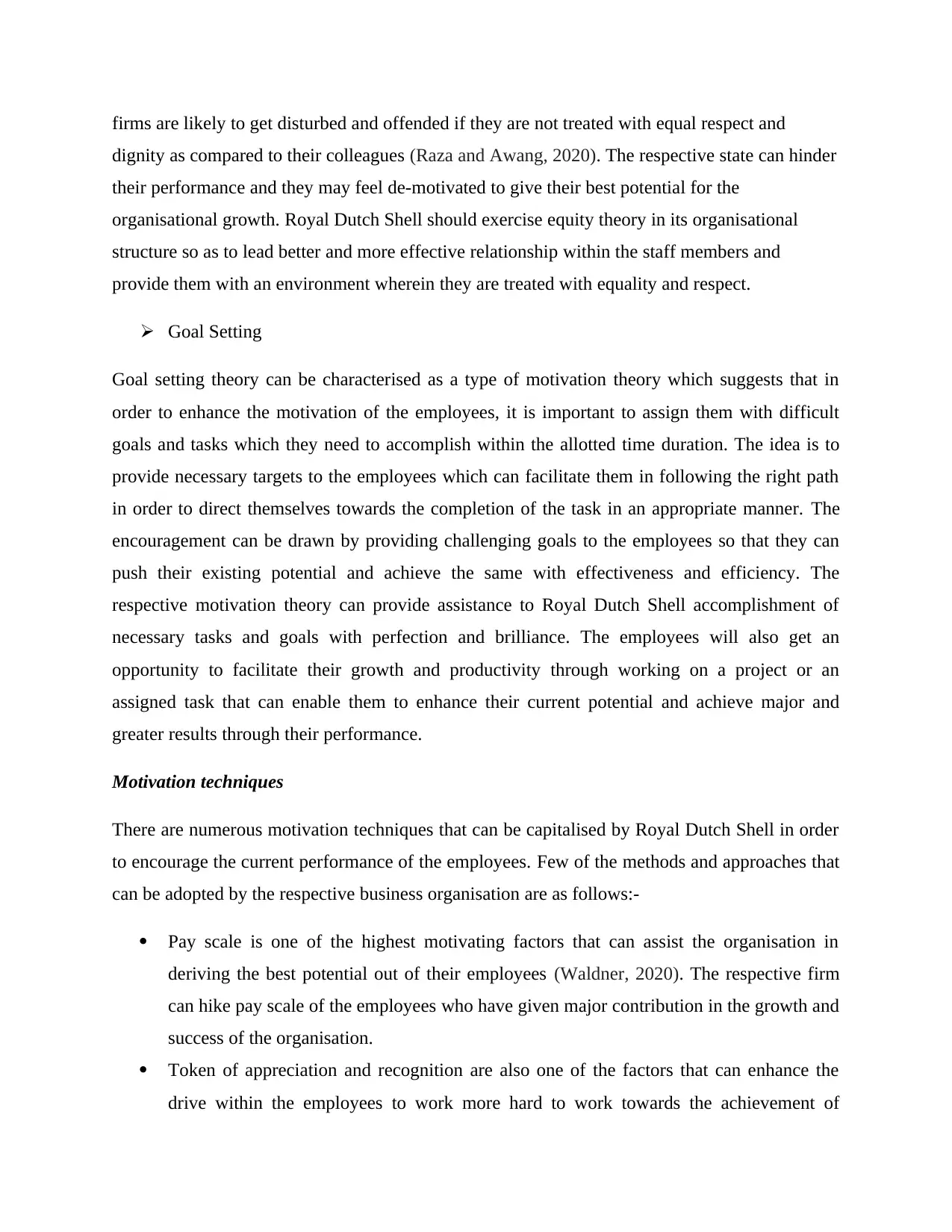
firms are likely to get disturbed and offended if they are not treated with equal respect and
dignity as compared to their colleagues (Raza and Awang, 2020). The respective state can hinder
their performance and they may feel de-motivated to give their best potential for the
organisational growth. Royal Dutch Shell should exercise equity theory in its organisational
structure so as to lead better and more effective relationship within the staff members and
provide them with an environment wherein they are treated with equality and respect.
Goal Setting
Goal setting theory can be characterised as a type of motivation theory which suggests that in
order to enhance the motivation of the employees, it is important to assign them with difficult
goals and tasks which they need to accomplish within the allotted time duration. The idea is to
provide necessary targets to the employees which can facilitate them in following the right path
in order to direct themselves towards the completion of the task in an appropriate manner. The
encouragement can be drawn by providing challenging goals to the employees so that they can
push their existing potential and achieve the same with effectiveness and efficiency. The
respective motivation theory can provide assistance to Royal Dutch Shell accomplishment of
necessary tasks and goals with perfection and brilliance. The employees will also get an
opportunity to facilitate their growth and productivity through working on a project or an
assigned task that can enable them to enhance their current potential and achieve major and
greater results through their performance.
Motivation techniques
There are numerous motivation techniques that can be capitalised by Royal Dutch Shell in order
to encourage the current performance of the employees. Few of the methods and approaches that
can be adopted by the respective business organisation are as follows:-
Pay scale is one of the highest motivating factors that can assist the organisation in
deriving the best potential out of their employees (Waldner, 2020). The respective firm
can hike pay scale of the employees who have given major contribution in the growth and
success of the organisation.
Token of appreciation and recognition are also one of the factors that can enhance the
drive within the employees to work more hard to work towards the achievement of
dignity as compared to their colleagues (Raza and Awang, 2020). The respective state can hinder
their performance and they may feel de-motivated to give their best potential for the
organisational growth. Royal Dutch Shell should exercise equity theory in its organisational
structure so as to lead better and more effective relationship within the staff members and
provide them with an environment wherein they are treated with equality and respect.
Goal Setting
Goal setting theory can be characterised as a type of motivation theory which suggests that in
order to enhance the motivation of the employees, it is important to assign them with difficult
goals and tasks which they need to accomplish within the allotted time duration. The idea is to
provide necessary targets to the employees which can facilitate them in following the right path
in order to direct themselves towards the completion of the task in an appropriate manner. The
encouragement can be drawn by providing challenging goals to the employees so that they can
push their existing potential and achieve the same with effectiveness and efficiency. The
respective motivation theory can provide assistance to Royal Dutch Shell accomplishment of
necessary tasks and goals with perfection and brilliance. The employees will also get an
opportunity to facilitate their growth and productivity through working on a project or an
assigned task that can enable them to enhance their current potential and achieve major and
greater results through their performance.
Motivation techniques
There are numerous motivation techniques that can be capitalised by Royal Dutch Shell in order
to encourage the current performance of the employees. Few of the methods and approaches that
can be adopted by the respective business organisation are as follows:-
Pay scale is one of the highest motivating factors that can assist the organisation in
deriving the best potential out of their employees (Waldner, 2020). The respective firm
can hike pay scale of the employees who have given major contribution in the growth and
success of the organisation.
Token of appreciation and recognition are also one of the factors that can enhance the
drive within the employees to work more hard to work towards the achievement of
Paraphrase This Document
Need a fresh take? Get an instant paraphrase of this document with our AI Paraphraser
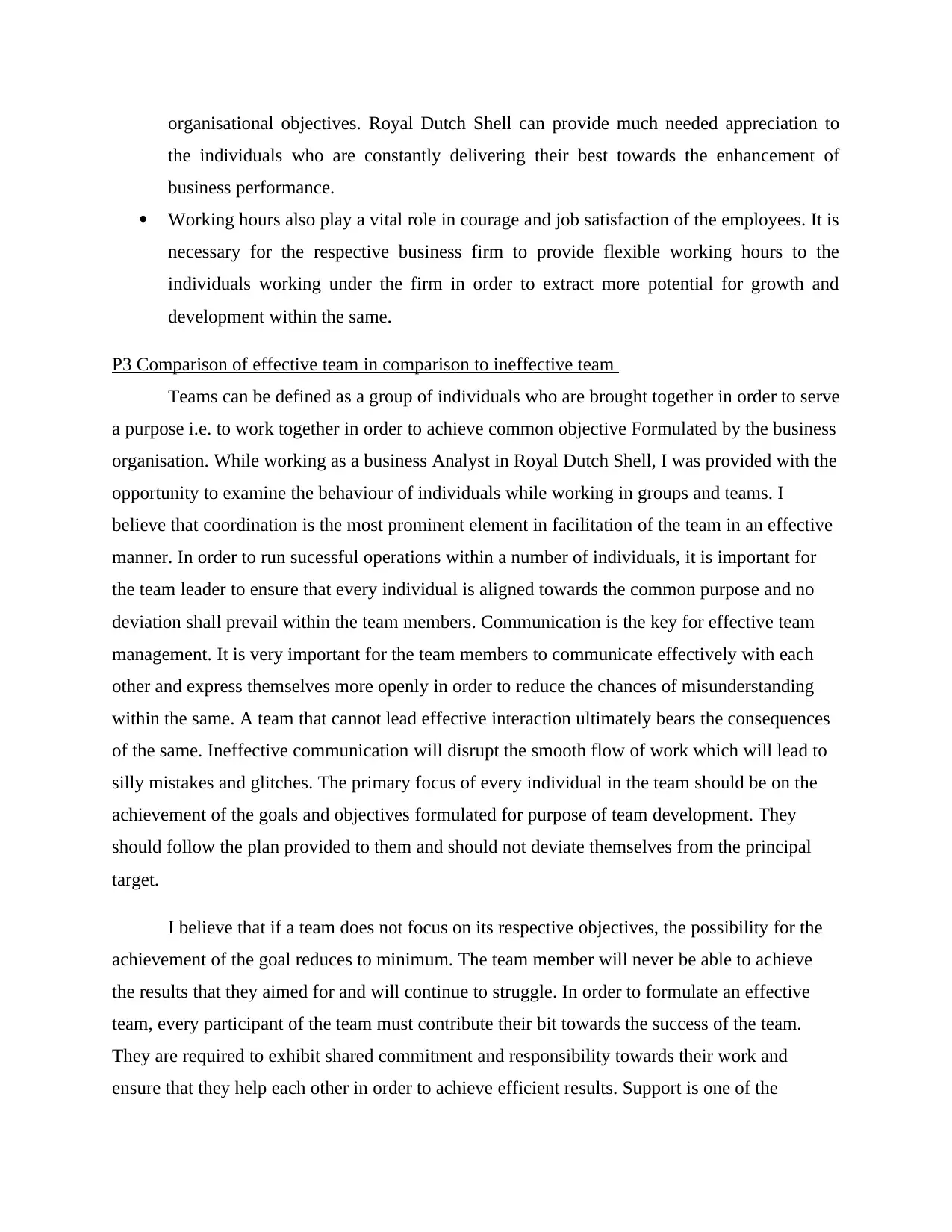
organisational objectives. Royal Dutch Shell can provide much needed appreciation to
the individuals who are constantly delivering their best towards the enhancement of
business performance.
Working hours also play a vital role in courage and job satisfaction of the employees. It is
necessary for the respective business firm to provide flexible working hours to the
individuals working under the firm in order to extract more potential for growth and
development within the same.
P3 Comparison of effective team in comparison to ineffective team
Teams can be defined as a group of individuals who are brought together in order to serve
a purpose i.e. to work together in order to achieve common objective Formulated by the business
organisation. While working as a business Analyst in Royal Dutch Shell, I was provided with the
opportunity to examine the behaviour of individuals while working in groups and teams. I
believe that coordination is the most prominent element in facilitation of the team in an effective
manner. In order to run sucessful operations within a number of individuals, it is important for
the team leader to ensure that every individual is aligned towards the common purpose and no
deviation shall prevail within the team members. Communication is the key for effective team
management. It is very important for the team members to communicate effectively with each
other and express themselves more openly in order to reduce the chances of misunderstanding
within the same. A team that cannot lead effective interaction ultimately bears the consequences
of the same. Ineffective communication will disrupt the smooth flow of work which will lead to
silly mistakes and glitches. The primary focus of every individual in the team should be on the
achievement of the goals and objectives formulated for purpose of team development. They
should follow the plan provided to them and should not deviate themselves from the principal
target.
I believe that if a team does not focus on its respective objectives, the possibility for the
achievement of the goal reduces to minimum. The team member will never be able to achieve
the results that they aimed for and will continue to struggle. In order to formulate an effective
team, every participant of the team must contribute their bit towards the success of the team.
They are required to exhibit shared commitment and responsibility towards their work and
ensure that they help each other in order to achieve efficient results. Support is one of the
the individuals who are constantly delivering their best towards the enhancement of
business performance.
Working hours also play a vital role in courage and job satisfaction of the employees. It is
necessary for the respective business firm to provide flexible working hours to the
individuals working under the firm in order to extract more potential for growth and
development within the same.
P3 Comparison of effective team in comparison to ineffective team
Teams can be defined as a group of individuals who are brought together in order to serve
a purpose i.e. to work together in order to achieve common objective Formulated by the business
organisation. While working as a business Analyst in Royal Dutch Shell, I was provided with the
opportunity to examine the behaviour of individuals while working in groups and teams. I
believe that coordination is the most prominent element in facilitation of the team in an effective
manner. In order to run sucessful operations within a number of individuals, it is important for
the team leader to ensure that every individual is aligned towards the common purpose and no
deviation shall prevail within the team members. Communication is the key for effective team
management. It is very important for the team members to communicate effectively with each
other and express themselves more openly in order to reduce the chances of misunderstanding
within the same. A team that cannot lead effective interaction ultimately bears the consequences
of the same. Ineffective communication will disrupt the smooth flow of work which will lead to
silly mistakes and glitches. The primary focus of every individual in the team should be on the
achievement of the goals and objectives formulated for purpose of team development. They
should follow the plan provided to them and should not deviate themselves from the principal
target.
I believe that if a team does not focus on its respective objectives, the possibility for the
achievement of the goal reduces to minimum. The team member will never be able to achieve
the results that they aimed for and will continue to struggle. In order to formulate an effective
team, every participant of the team must contribute their bit towards the success of the team.
They are required to exhibit shared commitment and responsibility towards their work and
ensure that they help each other in order to achieve efficient results. Support is one of the
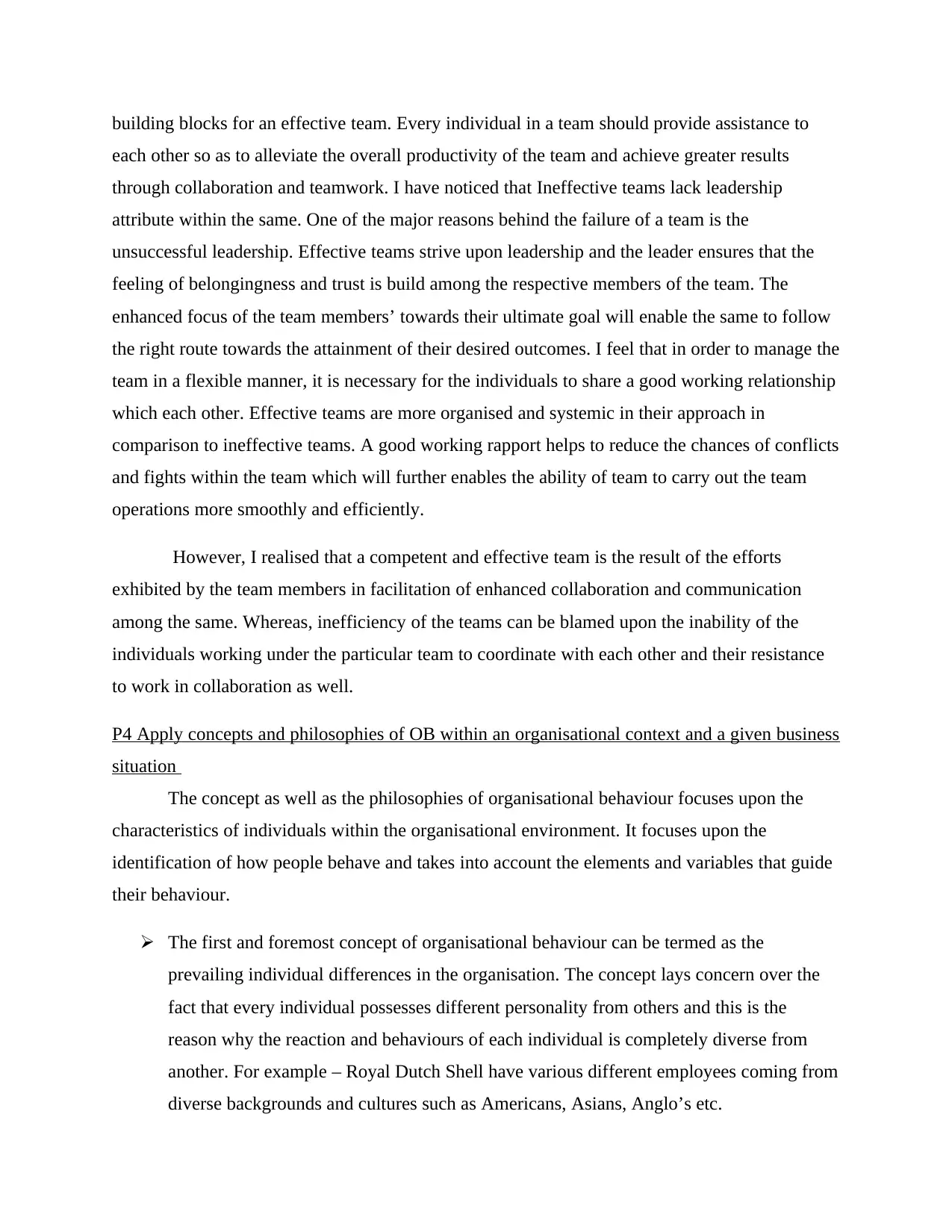
building blocks for an effective team. Every individual in a team should provide assistance to
each other so as to alleviate the overall productivity of the team and achieve greater results
through collaboration and teamwork. I have noticed that Ineffective teams lack leadership
attribute within the same. One of the major reasons behind the failure of a team is the
unsuccessful leadership. Effective teams strive upon leadership and the leader ensures that the
feeling of belongingness and trust is build among the respective members of the team. The
enhanced focus of the team members’ towards their ultimate goal will enable the same to follow
the right route towards the attainment of their desired outcomes. I feel that in order to manage the
team in a flexible manner, it is necessary for the individuals to share a good working relationship
which each other. Effective teams are more organised and systemic in their approach in
comparison to ineffective teams. A good working rapport helps to reduce the chances of conflicts
and fights within the team which will further enables the ability of team to carry out the team
operations more smoothly and efficiently.
However, I realised that a competent and effective team is the result of the efforts
exhibited by the team members in facilitation of enhanced collaboration and communication
among the same. Whereas, inefficiency of the teams can be blamed upon the inability of the
individuals working under the particular team to coordinate with each other and their resistance
to work in collaboration as well.
P4 Apply concepts and philosophies of OB within an organisational context and a given business
situation
The concept as well as the philosophies of organisational behaviour focuses upon the
characteristics of individuals within the organisational environment. It focuses upon the
identification of how people behave and takes into account the elements and variables that guide
their behaviour.
The first and foremost concept of organisational behaviour can be termed as the
prevailing individual differences in the organisation. The concept lays concern over the
fact that every individual possesses different personality from others and this is the
reason why the reaction and behaviours of each individual is completely diverse from
another. For example – Royal Dutch Shell have various different employees coming from
diverse backgrounds and cultures such as Americans, Asians, Anglo’s etc.
each other so as to alleviate the overall productivity of the team and achieve greater results
through collaboration and teamwork. I have noticed that Ineffective teams lack leadership
attribute within the same. One of the major reasons behind the failure of a team is the
unsuccessful leadership. Effective teams strive upon leadership and the leader ensures that the
feeling of belongingness and trust is build among the respective members of the team. The
enhanced focus of the team members’ towards their ultimate goal will enable the same to follow
the right route towards the attainment of their desired outcomes. I feel that in order to manage the
team in a flexible manner, it is necessary for the individuals to share a good working relationship
which each other. Effective teams are more organised and systemic in their approach in
comparison to ineffective teams. A good working rapport helps to reduce the chances of conflicts
and fights within the team which will further enables the ability of team to carry out the team
operations more smoothly and efficiently.
However, I realised that a competent and effective team is the result of the efforts
exhibited by the team members in facilitation of enhanced collaboration and communication
among the same. Whereas, inefficiency of the teams can be blamed upon the inability of the
individuals working under the particular team to coordinate with each other and their resistance
to work in collaboration as well.
P4 Apply concepts and philosophies of OB within an organisational context and a given business
situation
The concept as well as the philosophies of organisational behaviour focuses upon the
characteristics of individuals within the organisational environment. It focuses upon the
identification of how people behave and takes into account the elements and variables that guide
their behaviour.
The first and foremost concept of organisational behaviour can be termed as the
prevailing individual differences in the organisation. The concept lays concern over the
fact that every individual possesses different personality from others and this is the
reason why the reaction and behaviours of each individual is completely diverse from
another. For example – Royal Dutch Shell have various different employees coming from
diverse backgrounds and cultures such as Americans, Asians, Anglo’s etc.
⊘ This is a preview!⊘
Do you want full access?
Subscribe today to unlock all pages.

Trusted by 1+ million students worldwide
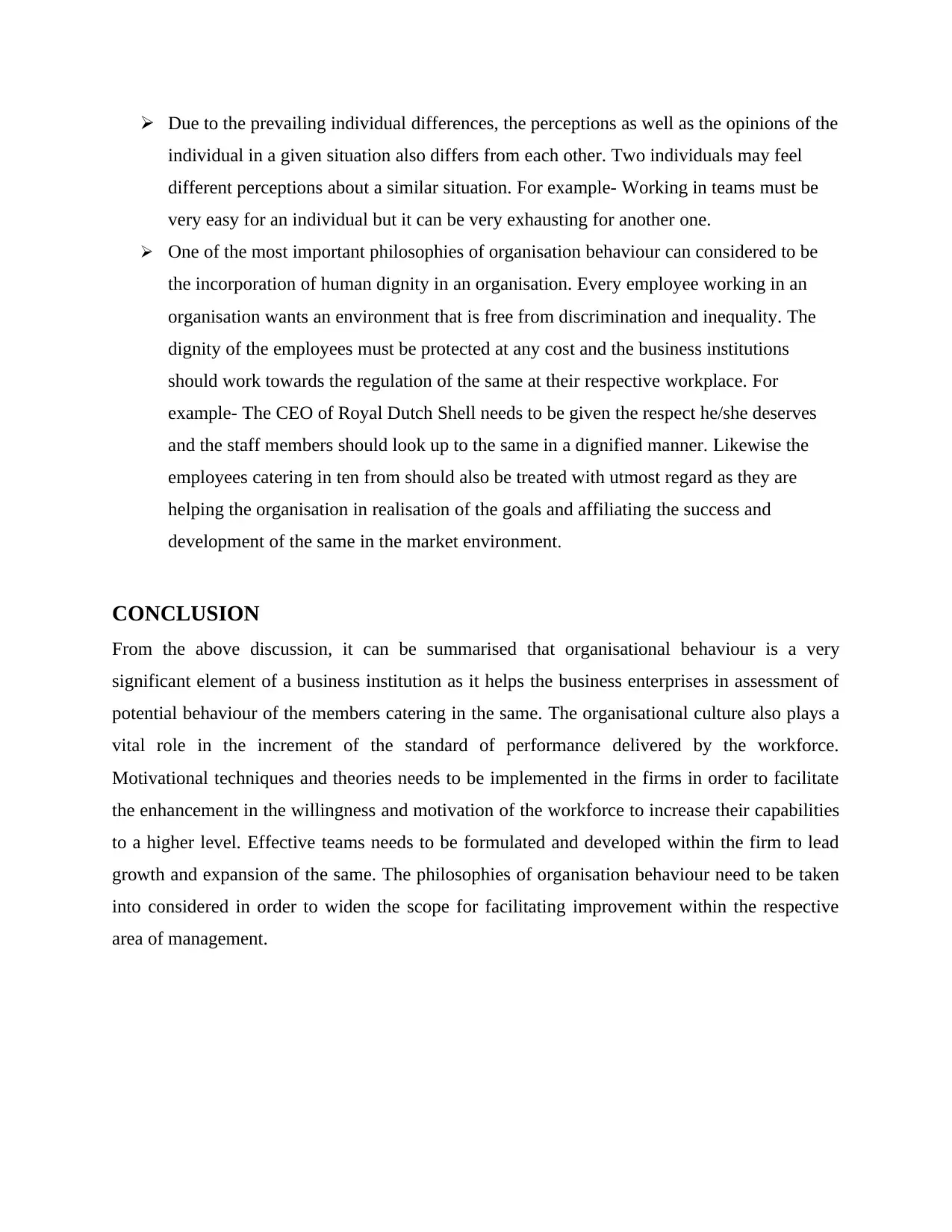
Due to the prevailing individual differences, the perceptions as well as the opinions of the
individual in a given situation also differs from each other. Two individuals may feel
different perceptions about a similar situation. For example- Working in teams must be
very easy for an individual but it can be very exhausting for another one.
One of the most important philosophies of organisation behaviour can considered to be
the incorporation of human dignity in an organisation. Every employee working in an
organisation wants an environment that is free from discrimination and inequality. The
dignity of the employees must be protected at any cost and the business institutions
should work towards the regulation of the same at their respective workplace. For
example- The CEO of Royal Dutch Shell needs to be given the respect he/she deserves
and the staff members should look up to the same in a dignified manner. Likewise the
employees catering in ten from should also be treated with utmost regard as they are
helping the organisation in realisation of the goals and affiliating the success and
development of the same in the market environment.
CONCLUSION
From the above discussion, it can be summarised that organisational behaviour is a very
significant element of a business institution as it helps the business enterprises in assessment of
potential behaviour of the members catering in the same. The organisational culture also plays a
vital role in the increment of the standard of performance delivered by the workforce.
Motivational techniques and theories needs to be implemented in the firms in order to facilitate
the enhancement in the willingness and motivation of the workforce to increase their capabilities
to a higher level. Effective teams needs to be formulated and developed within the firm to lead
growth and expansion of the same. The philosophies of organisation behaviour need to be taken
into considered in order to widen the scope for facilitating improvement within the respective
area of management.
individual in a given situation also differs from each other. Two individuals may feel
different perceptions about a similar situation. For example- Working in teams must be
very easy for an individual but it can be very exhausting for another one.
One of the most important philosophies of organisation behaviour can considered to be
the incorporation of human dignity in an organisation. Every employee working in an
organisation wants an environment that is free from discrimination and inequality. The
dignity of the employees must be protected at any cost and the business institutions
should work towards the regulation of the same at their respective workplace. For
example- The CEO of Royal Dutch Shell needs to be given the respect he/she deserves
and the staff members should look up to the same in a dignified manner. Likewise the
employees catering in ten from should also be treated with utmost regard as they are
helping the organisation in realisation of the goals and affiliating the success and
development of the same in the market environment.
CONCLUSION
From the above discussion, it can be summarised that organisational behaviour is a very
significant element of a business institution as it helps the business enterprises in assessment of
potential behaviour of the members catering in the same. The organisational culture also plays a
vital role in the increment of the standard of performance delivered by the workforce.
Motivational techniques and theories needs to be implemented in the firms in order to facilitate
the enhancement in the willingness and motivation of the workforce to increase their capabilities
to a higher level. Effective teams needs to be formulated and developed within the firm to lead
growth and expansion of the same. The philosophies of organisation behaviour need to be taken
into considered in order to widen the scope for facilitating improvement within the respective
area of management.
Paraphrase This Document
Need a fresh take? Get an instant paraphrase of this document with our AI Paraphraser
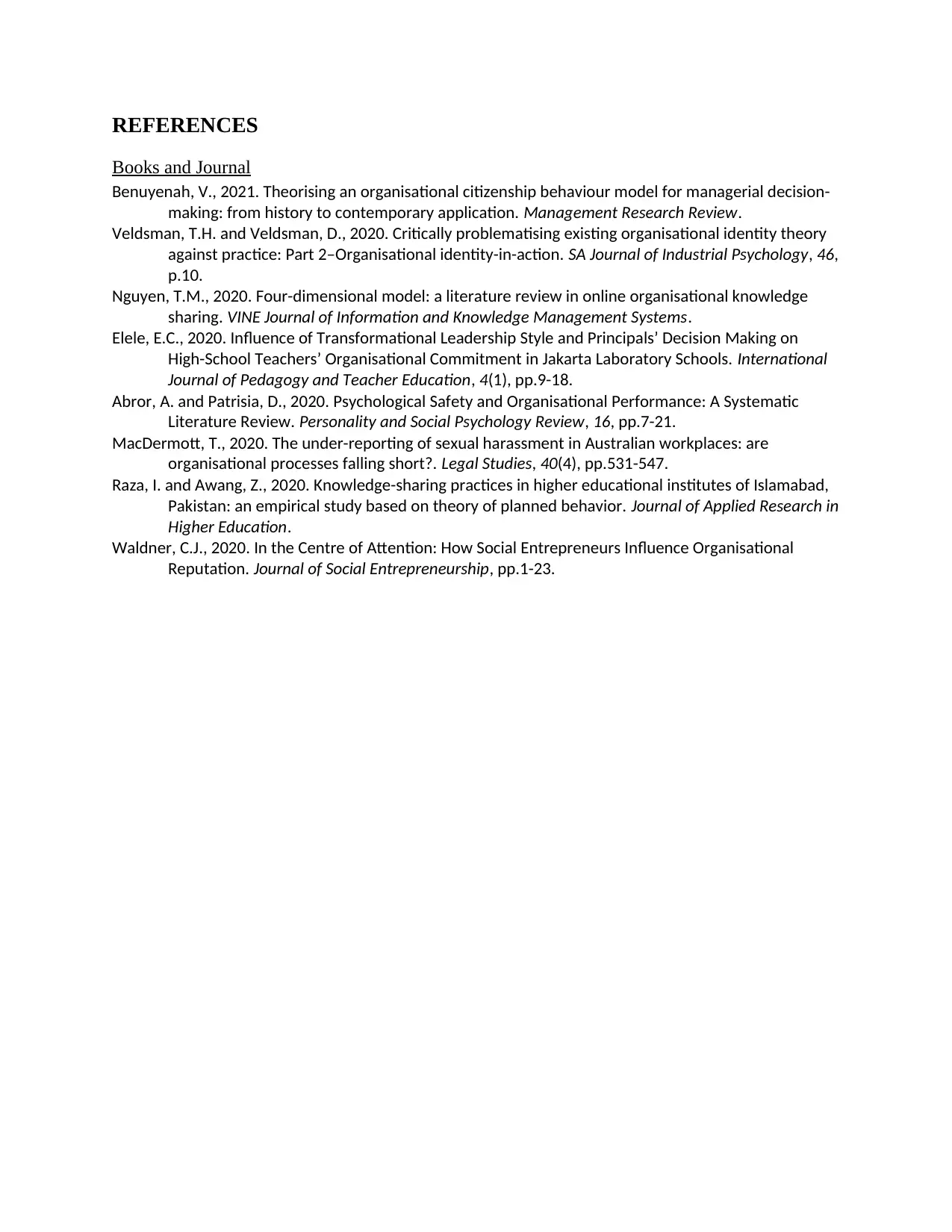
REFERENCES
Books and Journal
Benuyenah, V., 2021. Theorising an organisational citizenship behaviour model for managerial decision-
making: from history to contemporary application. Management Research Review.
Veldsman, T.H. and Veldsman, D., 2020. Critically problematising existing organisational identity theory
against practice: Part 2–Organisational identity-in-action. SA Journal of Industrial Psychology, 46,
p.10.
Nguyen, T.M., 2020. Four-dimensional model: a literature review in online organisational knowledge
sharing. VINE Journal of Information and Knowledge Management Systems.
Elele, E.C., 2020. Influence of Transformational Leadership Style and Principals’ Decision Making on
High-School Teachers’ Organisational Commitment in Jakarta Laboratory Schools. International
Journal of Pedagogy and Teacher Education, 4(1), pp.9-18.
Abror, A. and Patrisia, D., 2020. Psychological Safety and Organisational Performance: A Systematic
Literature Review. Personality and Social Psychology Review, 16, pp.7-21.
MacDermott, T., 2020. The under-reporting of sexual harassment in Australian workplaces: are
organisational processes falling short?. Legal Studies, 40(4), pp.531-547.
Raza, I. and Awang, Z., 2020. Knowledge-sharing practices in higher educational institutes of Islamabad,
Pakistan: an empirical study based on theory of planned behavior. Journal of Applied Research in
Higher Education.
Waldner, C.J., 2020. In the Centre of Attention: How Social Entrepreneurs Influence Organisational
Reputation. Journal of Social Entrepreneurship, pp.1-23.
Books and Journal
Benuyenah, V., 2021. Theorising an organisational citizenship behaviour model for managerial decision-
making: from history to contemporary application. Management Research Review.
Veldsman, T.H. and Veldsman, D., 2020. Critically problematising existing organisational identity theory
against practice: Part 2–Organisational identity-in-action. SA Journal of Industrial Psychology, 46,
p.10.
Nguyen, T.M., 2020. Four-dimensional model: a literature review in online organisational knowledge
sharing. VINE Journal of Information and Knowledge Management Systems.
Elele, E.C., 2020. Influence of Transformational Leadership Style and Principals’ Decision Making on
High-School Teachers’ Organisational Commitment in Jakarta Laboratory Schools. International
Journal of Pedagogy and Teacher Education, 4(1), pp.9-18.
Abror, A. and Patrisia, D., 2020. Psychological Safety and Organisational Performance: A Systematic
Literature Review. Personality and Social Psychology Review, 16, pp.7-21.
MacDermott, T., 2020. The under-reporting of sexual harassment in Australian workplaces: are
organisational processes falling short?. Legal Studies, 40(4), pp.531-547.
Raza, I. and Awang, Z., 2020. Knowledge-sharing practices in higher educational institutes of Islamabad,
Pakistan: an empirical study based on theory of planned behavior. Journal of Applied Research in
Higher Education.
Waldner, C.J., 2020. In the Centre of Attention: How Social Entrepreneurs Influence Organisational
Reputation. Journal of Social Entrepreneurship, pp.1-23.

⊘ This is a preview!⊘
Do you want full access?
Subscribe today to unlock all pages.

Trusted by 1+ million students worldwide
1 out of 12
Related Documents
Your All-in-One AI-Powered Toolkit for Academic Success.
+13062052269
info@desklib.com
Available 24*7 on WhatsApp / Email
![[object Object]](/_next/static/media/star-bottom.7253800d.svg)
Unlock your academic potential
Copyright © 2020–2026 A2Z Services. All Rights Reserved. Developed and managed by ZUCOL.





